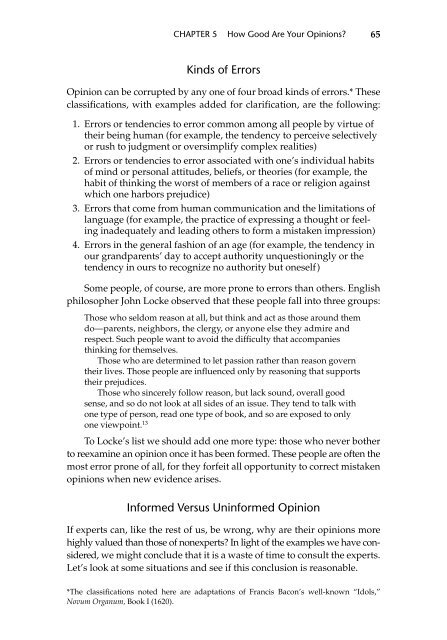Beyond Feelings
Beyond Feelings
Beyond Feelings
You also want an ePaper? Increase the reach of your titles
YUMPU automatically turns print PDFs into web optimized ePapers that Google loves.
CHAPTER 5 How Good Are Your Opinions?<br />
Kinds of Errors<br />
Opinion can be corrupted by any one of four broad kinds of errors.* These<br />
classifications, with examples added for clarification, are the following:<br />
1. Errors or tendencies to error common among all people by virtue of<br />
their being human (for example, the tendency to perceive selectively<br />
or rush to judgment or oversimplify complex realities)<br />
2. Errors or tendencies to error associated with one’s individual habits<br />
of mind or personal attitudes, beliefs, or theories (for example, the<br />
habit of thinking the worst of members of a race or religion against<br />
which one harbors prejudice)<br />
3. Errors that come from human communication and the limitations of<br />
language (for example, the practice of expressing a thought or feeling<br />
inadequately and leading others to form a mistaken impression)<br />
4. Errors in the general fashion of an age (for example, the tendency in<br />
our grandparents’ day to accept authority unquestioningly or the<br />
tendency in ours to recognize no authority but oneself)<br />
Some people, of course, are more prone to errors than others. English<br />
philosopher John Locke observed that these people fall into three groups:<br />
Those who seldom reason at all, but think and act as those around them<br />
do—parents, neighbors, the clergy, or anyone else they admire and<br />
respect. Such people want to avoid the difficulty that accompanies<br />
thinking for themselves.<br />
Those who are determined to let passion rather than reason govern<br />
their lives. Those people are influenced only by reasoning that supports<br />
their prejudices.<br />
Those who sincerely follow reason, but lack sound, overall good<br />
sense, and so do not look at all sides of an issue. They tend to talk with<br />
one type of person, read one type of book, and so are exposed to only<br />
one viewpoint. 13<br />
To Locke’s list we should add one more type: those who never bother<br />
to reexamine an opinion once it has been formed. These people are often the<br />
most error prone of all, for they forfeit all opportunity to correct mistaken<br />
opinions when new evidence arises.<br />
Informed Versus Uninformed Opinion<br />
If experts can, like the rest of us, be wrong, why are their opinions more<br />
highly valued than those of nonexperts? In light of the examples we have considered,<br />
we might conclude that it is a waste of time to consult the experts.<br />
Let’s look at some situations and see if this conclusion is reasonable.<br />
*The classifications noted here are adaptations of Francis Bacon’s well-known “Idols,”<br />
Novum Organum, Book I (1620).<br />
65


